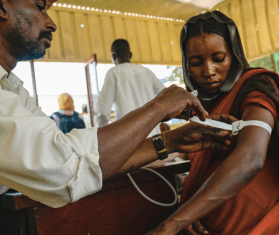Vaccination coverage remains low throughout Chad, and many families, including those living in urban areas, have difficulty accessing routine immunization services. Doctors Without Borders/Médecins Sans Frontières (MSF) recently partnered with the Chadian Ministry of Public Health to carry out targeted outreach campaigns for vaccination and health education.
As Chad experiences an upsurge in measles cases, MSF has launched a vaccination campaign in Moyen Chari and Salamat provinces to support health authorities in their efforts to curb the spread of this highly contagious and deadly disease.
In May, nearly 40,000 children were vaccinated against measles by the MSF emergency response team supporting the Chadian Ministry of Public Health in Salamat and Moyen Chari. This vaccination campaign targeted children between 6 months and 10 years old and was accompanied by a catch-up of routine vaccinations under the expanded immunization program for 1,848 children under 11 months old. In addition, 950 people with measles, including 799 children between 6 months and 5 years old, were treated at Am-Timan provincial hospital and health centers.
Measles intervention in Moyen Chari and Salamat
- Nearly 40,000 children vaccinated against measles
- More than 950 people treated for measles, including 799 children between 6 months and 5 years old
- More than 27,000 people reached by MSF health promotion teams
- 1,848 children caught up on routine vaccinations
Measles is an acute viral infection of the respiratory system characterized by a rash of tiny red dots. It is one of the world’s most contagious diseases and a leading killer of children in parts of the world, including in Chad, which experiences recurrent outbreaks. In the absence of specific treatment, vaccination is the most effective medical tool against the disease. However, vaccination coverage remains low throughout the country, and many families, including those living in urban areas, have difficulty accessing routine expanded immunization program services.
Awareness and health promotion are at the core of our approach
Community involvement is at the heart of MSF's activities in Chad, leading to better understanding, acceptance, and participation in activities. It also helps raise awareness of health risks and helps people make informed decisions about their health. As part of this intervention, MSF health promotion teams worked closely with local communities to raise awareness among more than 27,000 people about measles, free health care, diseases with epidemic potential, nutrition, and the importance of vaccination.

"These efforts play a crucial role in preventing the spread of measles," explained Mbaiornom Dankar Fidele, health promotion supervisor. "We work together with local communities, whether it's awareness-raising, promotion, or mutual support, so that they feel involved and concerned in the fight against measles."
The emergency response team was set up to provide a rapid and effective response for victims of armed conflict, communities affected by epidemics or endemics, and victims of natural disasters, violence, or exclusion from health care. MSF supports the Ministry of Health in several regions across Chad, providing a wide range of care including consultations, hospitalization, medico-nutritional care, surgery, maternal and child care, mental health, and many non-medical needs.
In 2023, MSF teams in Chad vaccinated more than 1 million people against measles, carried out nearly 250,000 outpatient consultations, treated more than 134,400 people for malaria, cared for more than 31,900 children suffering from severe acute malnutrition, and treated nearly 15,000 hospitalized patients.




